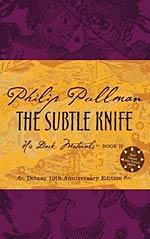
![]() spectru
spectru
8/22/2014
![]()
The Subtle Knife is the second book in the trilogy, His Dark Materials. While I really like science fiction, I have no affinity for fantasy. It sometimes irks me that they are so often chained together. There is occasionally some mixing, some overlap, of course, but that's not inherent. They really are two distinct genres. I tend to have trouble with the suspension of disbelief where the supernatural is involved. The Subtle Knife is fantasy. It has some elements that I have to take with a grain of salt.
Having said all that, The Subtle Knife isn't half bad. Pullman weaves a pretty good story and some of the things about The Golden Compass are clarified. The world of Lyra, Lord Asrial, and Mrs Coulter in The Golden Compass is in fact a separate reality that exists alongside our own, not just a fictitious world. In The Subtle Knife, we are introduced to a new main character, Will, who lives in our reality and who stumbles upon a window into a different world and there meets Lyra. It's a world in between each of their home worlds. Will acquires the subtle knife, a knife of great powers. It can cut anything easily and can cut windows between the worlds. So Will with his knife and Lyra with her alethiometer (the golden compass from the title of the first book) become compatriots and co-conspirators in adventure. With the help of the witches, they embark on a quest whose mission is unclear. The story weaves its twisted path, gains intensity, and has a strong finish with the bad guys nipping a their heels. It ends in something of a cliffhanger with Lyra missing in action and Will's mission having been defined.
The story in The Subtle Knife keeps our attention throughout; it never lags. Seeing the relationship between Lyra's world and Will's world (our world) was very helpful for me in grounding the setting. In The Golden Compass it wasn't comfortable for me to accept the plethora of supernatural aspects, daemons, witches, ghasts (a sort of goblin), sentient bears, prescience, etc. In The Subtle Knife, the role of daemons, manifestations of a person's soul, becomes more comfortable as do the witches. I did feel that there was some gratuitous fantasy, particularly in the Specters, amorphous evil beings, invisible to children, who sucked the awareness out of adults except for Mrs. Coulter, who was able to control them.
The Subtle knife finally grabbed me near the end. Aeronaut Lee Scoresby meets Stanislaus Grumman, who is actually John Parry, Will's father, an explorer who had disappeared a decade earlier. Together they abscond in Scoresby's balloon, pursued by the minions of The Authority in zeppelins. The action reaches a peak in Scoresby's heroic last stand against the pursuing soldiers. He receives multiple wounds but succeeds in killing all the soldiers and destroying their zeppelin. I was a little dismayed that this scene, in which Scoresby and his daemon had so bravely vanquished the bad guys so that Grumman could escape, is ended by the author with "and then they died." It seemed such an inadequate ending for an effort of such bravery and sacrifice.
At the very end of the novel John Parry, a.k.a. Grumman, is murdered by a rejected lover, a witch, just at the instant that Will realizes that he is his father. Grumman's daemon dies with him. It's left to our imagination how Grumman, who is from Will's world, acquired a daemon.
The controversy of religion surrounding His Dark Materials had interested me. It had been denounced as being anti-Catholic. In The Golden Compass, the Church is portrayed negatively. It is, however, not the Church of our world. The Vatican has been moved from Rome and doctrine is dictated by the Magisterium. The Magisterium is the evil power driving the plot in The Golden Compass. In The Subtle Knife there is less mention of the Magisterium. Only at the end does the religious element enter the story. There is an impending war, the greatest war in history. The combatants are the forces garnered by Lord Asrial, Lyra's father, including angels and witches, against the forces of The Authority (God) including the villainous Mrs. Coulter, Lyra's mother. All the good guys in the story, Lyra, Will, and others are aligned with Asrial and fear Mrs. Coulter.
The analogy is clear. The coming war is a redux of the rebellion against God by angels in heaven which brought about the expulsion of Satan. The implication is that Asrial is Satan and that Asrial (Satan) is good, and The Authority (God) is evil. We also learn that Lyra is Eve and Mrs. Coulter is determined to prevent the second fall.
After reading The Golden Compass, I wasn't all that keen on continuing the trilogy. I enjoyed The Subtle Knife more than The Golden Compass. I'm ready for the third book.